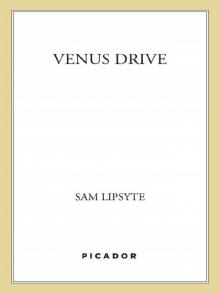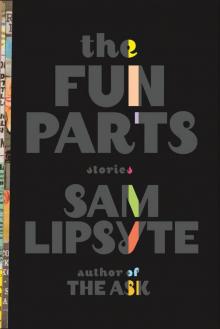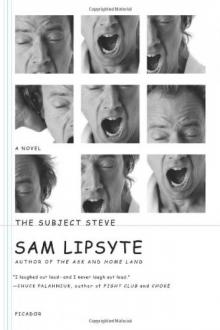- Home
- Sam Lipsyte
Home Land Page 2
Home Land Read online
Page 2
A trick to make a candy bar better? She’s a sorceress, his mother, a good witch. She takes perfection and perfects it.
“We’ll put it in the freezer. Wait L., wait, and it will be worth it.”
He loves it when she calls him L.
Home, he bolts from the car with his candy bar under his shirt. He must shield it from the elements. It’s a fine spring day but he knows full well there are elements about, eager to drench, to blight, to melt. He runs to the kitchen and eases the candy bar into the freezer, slides it between some cellophaned soy burgers and a foil-wrapped package he knows from past reconnaissance to be a half-loaf of zucchini bread. His mother trails in after him with the grocery sacks, sees him standing sentry at the freezer door.
“It’s going to take a while, L. Go play.”
Go play? A mighty and delicious molecular transformation is taking place!
“I mean it, L. Go play in the basement.”
Go play in the basement? How far from the locus of his happiness must he trek? Okay, the basement. He treks down to the basement. Play commences with some British commando, his usual wade-in-the-river-scale-the-pylon-stab-the-Kraut commando, but when he gets the rubber knife in his mouth and starts up his father’s stepladder, the blade, he swears, tastes of nougat.
He does Gettysburg instead, dons his Union cap, wipes out the Army of Northern Virginia with his plastic musket from the hobby shop. Those dead racist bastards pile up in some dry valley of his mind. The slaves make songs for him, a vaporish version of his father beams. Still, he notes, his musket is much the color of milk chocolate. Is Witch-Mommy’s alchemy working? Go play, Goddamnit. He wills himself back to slaughter, Omaha Beach, Khe Sanh, spits clips at Victor Charlie until his musket, now by dint of an alternate grip an M-16, jams. Just fucking typical. The Cong burst out of the broom closet, AKs blazing. He hurls himself at the wood-paneled wall. Drool for blood slides down his chin.
“I’m hit, I’m hit,” he says. “Medic!”
It’s a bitch, but it’s not Charlie’s fault. He had no right to be in Charlie’s basement.
The last thing he sees before he dies—and for a while afterward—is a spider on the new smoke alarm.
Spooky.
Enough is enough.
He finds his mother at the kitchen table. She’s doing crossword puzzles with a fountain pen. There’s a faint dark smear on the tip of her nose. The candy bar wrapper is bunched in a coffee cup. What’s a five-letter word for traitor?
“Mommy,” he says.
“I was just …” she says. “I had to test it, L. To see if it was okay. It was bad, baby. It was a bad candy bar. I’ll get you a good one.”
God, the guilt, hers, his. She gets him cupcakes, candy corn, gooey-sweet tarts. They never speak of freezing things again. Years later, when he kisses her cold calves in a hospital room, he sees what the trick had been. The trick was to give unto others that which you mean to seize. He’d be a sorcerer, too.
“A SORCERER?” said Gwendolyn, one of the few times I told her this tale. “Just because she ate your candy bar? My mom guzzled rye and beat us. My uncle put his dick in my armpit while I slept. My cousin hid my college acceptance letter until it was too late to reply. Your mother ate your candy bar?”
“It’s symbolic.”
“That’s what people say when they know they’ve come with the weak shit.”
“Fuck you,” I said.
“Excuse me?”
“I said fuck you,” I said. “I’ve been meaning to say it for a long time. I just couldn’t find the right words.”
Yes, this exchange occurred during a particularly frenzied juncture in our unraveling, but I always thought Gwendolyn missed the point of my story. The candy bar incident, aside from its obvious revelations regarding my character, or the deformation thereof, imparts a tremendous lesson about life’s treats in general: munch immediately! Maybe that could be a chapter in the self-help book I’ve been meaning to write, The Seven Habits of Highly Disappointed People, which I could probably bang out in an afternoon if I weren’t so busy updating you fine people on the latest in the life of me.
Perhaps now you understand why I haven’t waited for confirmation from that titan of secondary education, Principal Fontana, a man last seen bleeding profusely from one or more head wounds whose origins remain a delectable mystery. Doubtless he received my first installment, though it’s no shock he failed to include it in the latest edition of Catamount Notes. I’m sure he’s quite busy with whatever whirlwind he was in the midst of reaping that night we led him out of Brenda Bruno’s. Maybe his stitches got infected. Maybe the lovely Loretta is smearing antibiotic ointment on them even as I write. Oh, Loretta, daub some on your leg wool while you’re at it, hey?
YESTERDAY, Catamounts, it suddenly struck me that the vestibule of my house no longer reeks of human urine. It was some kind of olfactory epiphany, this absence of stench, and I traced it to the absence of my landlady, Mrs. Hildebrandt. This brittle gal lived below me for years and I’d help her with her groceries and such, though I must confess I wasn’t what would fall under the rubric of devastated when she sold the building and moved to Green Bay. She liked to run on about her surgeon sons, how dexterous and charitable they were, though apparently neither nimble nor generous enough to visit their only mother.
“My Tommy would eat you for lunch,” she’d often say, even as I was fixing hers.
I’d just chuckle, nod. I’ve always been an easy mark for the decrepit, the infirm. Do you by chance remember the secretary at Eastern Valley, Edna O’Grady? Old Lady O’Grady, you called her, and proffered remarks vis-à-vis the probable aridity of her birth canal, as did I, admittedly, but did you ever notice all that caramel on her desk come Valentine’s Day? Who do you figure shelled out the cash for all those heart-shaped goodies? Like I said, I’m a sucker for the crones. Maybe they remind me of my mother, had the chemo worked.
Mrs. Hildebrandt, though, she kindly cured me of my sentimentalist streak. The lady was needy, belligerent. She did not believe in boiler repair, denied both the Holocaust and the very idea that I’d ever paid her a security deposit. Plus, she was wont to call the cops for a noise complaint if I did so much as quietly moan at my computer screen after dinnertime. It’s a wonder I stayed so long. When dementia crept up on her like one of those ancient guild ninjas, I began to enjoy corroborating her suspicions that her visiting nurse was stealing bits of hair and skin from the divan. “People will pay a fortune for a white woman’s slough,” I told her. Mrs. Hildebrandt’s probably dead by now, buried deep in cold Wisconsin dirt, and I’d guess that Tommy and the rest of her hand-eye Gandhi brood don’t kneel at her tomb too often, either.
MY NEW LANDLORD PETE is a sweetheart. He’s a kid, really, barely out of Eastern Valley High himself, where now, in fact, he teaches phys. ed. You can tell he’s not born to landlordship, but he’ll learn. (Remember Vinnie Lazlo? Pete looks like Vinnie with muscles, hands.) The kid hails from a family of landlords, and someday, doubtless, he’ll be exhorting county marshals to spray buckshot at evicted spinsters, but for now he treats my tenancy in his building as a personal favor. Rent day he shuffles his feet at my door, a boy come for his bubblegum money. When the sink stops up he’s over in a jiff with his motorized snake. He works like a demon, albeit with no expertise, averts his eyes as though awaiting blows from kin.
Pete’s letting me coast a few weeks on the rent. I’m flat busted, Catamounts. Send check or money order care of me to—Ha! Ha! I’d never! Honestly, though, there’s a reason I’m tapped. I’m owed thousands by a soft drink juggernaut for my work compiling historical data for an in-house newsletter. (See, Catamount Notes isn’t the only rag in town!) I won’t name the outfit but suffice it to say their cola is not sweeter than the other one. The newsletter, Fizz, is designed to amuse distributors with FunFacts, or FakeFacts, as I tend to concoct them. Prez Truman downs an entire bottle of the famed elixir before giving the heave-ho to Fat Man. Mister Sidney Vicious h
as some sent up to his Chelsea Hotel suite the night he smites the fetching Spungeon. I haven’t a clue where I get this crap. There must truly be a collective unconscious, all syrupped and bubbly, but not as sweet as the other one.
PENNY BETTIS from the soft drink outfit called today to say they might cut my check next week. This is how I know it’s Friday: Penny calls to deliver false hope. I’ve never met her but she has one of those cozy phone voices people cultivate in lieu of truth. I don’t blame her for it, it’s protocol, and besides, I prefer ease to honesty. Isn’t that in our DNA? I’d like to think that with the proper woman I could reach denturehood and beyond swapping comforting obfuscations. Of course, she’d have to know jazz dancing and be willing to bundle her calves in wool for my load. Today I pictured Penny doing leg lifts by her desk while she offered up a FakeFact of her own.
“Accounting has your invoice,” she said. “They’re ready to process.”
“You said that last week,” I said.
“Last week was hell, honey. You don’t want to know.”
“Maybe we could get dinner and you could tell me.”
“You sound cute, but I’m taken.”
“Who is he, Penny?”
“None of your business.”
“Is he feverish for you?” I said. “Does he weep at the altar of your fat pussy?”
The line went dead. So did my hopes for timely remuneration. I tend to take things too far, Valley Cats. I figure I’m still chatting the woman up and she’s filing charges. It’s always been this way, as many of you might recall. Somebody chucks a snowball, I’m scouring the school yard for rocks. The bully just wants to shove sadness around, shake me down for spare change, I’m looking to scrape out his eye. I lack a sense of proportion. I have no sensitivity to sport. I’m the aggrieved rider on the grievous plain. I’m still pissed about the parade.
A MISSIVE from the man himself! It arrived this afternoon, penciled on what folks once called penny postcards, though they cost near two bits by now. Two bits! Two bits! I’m a cowboy of coins! Never mind, I’ll transcribe in full:
Hey, Miner:
Cut the crap. Whatever you think you saw you didn’t see. Nobody wants to read your babble, anyway. Catamount Notes is a forum for decent people to celebrate the ongoing celebration of their lives. Hence my decision to omit your update. Save it for the Teabag Review, okay? Or maybe the Scumbag Review would be better.
All Best,
Fontana
PS Who the hell is Jazz Loretta? What in Jesus Christ are you talking about?
I PORED OVER the postcard, hoped to precisely ascertain its tone, deconstruct its guiding logic, tease out its myriad tropes, but I lacked the proper training. Hate to say it, Catamounts, but we didn’t have tropes at Eastern Valley.
I called Gary at his Retractor Pad, read him Fontana’s card.
“You’ve got him on the run,” said Gary. “Now’s the time to go in for the kill.”
“What are you talking about?”
“I’m not sure.”
“I guess he’s pissed at me.”
“What’s he going to do? Suspend you?”
“Good point.”
“No matter what happens,” said Gary, “you must not be silenced. It’s like those poets they put in prison.”
“What poets?”
“Those poets. They’re heroes.”
“I guess so.”
“Step up. Be a fucking hero.”
“Fine,” I said. “I’ll be a hero. It’s not like they can put me in jail for writing updates.”
“You should read the paper, if that’s what you think.”
“I do read the paper.”
“You read that fascist one.”
“It’s funny.”
“Laugh for me when they put you up against the wall.”
“They better give me a cigarette.”
“Thank you for keeping our rape room smoke-free. What are you doing tonight?”
“They’ve got some submarine movies on TV.”
“You still like those, huh?”
“They speak to me.”
“No, I get it,” said Gary. “But what about fighter planes? A jet pilot shot down in the jungle. His hard-ass mentor hops in to extract him. They’ve got to blast their way out.”
“Those are good,” I said. “But I’m talking subs. The panic. The water pressure. Tyranny in a tiny tube.”
“It’s all war,” said Gary. “It all works.”
GOOD PEOPLE, as I peruse this latest update, composed, as you can see, in the face of severe Fontanian repression, it occurs to me that I’ve taken the wrong tack. My aim continues to be an essay into the truth of my condition, and thus, the Catamount condition, but under the current Notes regime, which seems willing to support only cheery falsehoods from the Eastern Valley community, the high fives and pom-pom struts of communal denial, it appears I’ve failed to heed an important lesson. Gwendolyn’s foolish comments about symbolism aside, the sole weapon against censorship is guile.
How shameful it’s come to this. Fontana was not always so despotic. Some of him is made of charm. Even the charmless parts, I believe, were acquired in provinces of real human pain. I could tell you some stories, true Fontana arcana, about his master’s thesis on adolescence in postwar American literature, his brief national poker ranking, the handles of White Horse delivered weekly to his house by ex-Catamount sousaphonist and Pittman Liquors scion Randy Pittman. I could delve into the man’s divorce after the teen escort scandal, his estrangement from his prim progeny. A lead is even developing on where he buys those hideous lime green jeans he favors in the springtime.
Don’t get me wrong. I’ve always had deep affection for Fontana. Back when he roamed the hallways of Eastern Valley there was a sort of compassless majesty about the man you couldn’t help but admire. He’d maybe lit out from one of his busted selves years before, wandered tundras of indecision, kept himself alive in bleak altitudes, battled the elements within and without, but never found that hidden pass to New Fontana.
I could tell you about the time he pulled me into his office for a private audience. It was late in my junior year. I’d been idling near the juice machine with Gary, watching him brandish his thumb nub to make a point. Gary had a lot of theories in those days. He was a fan of ancient astronauts, especially their work in the entertainment industry. Today’s lecture hinged on Thurman Munson, the great Yankee catcher of our youth. Munson, according to Guano, had not plunged to his death piloting a twin-engine airplane, but was living under an assumed identity, supervising a new secret baseball program in the Soviet Union.
“That’s bullshit,” I said. “I sold his widow a spaghetti spoon for our Weebalo fund-raising drive six years ago.”
“Which proves what?”
“She was a widow, man. Munson was dead.”
“Or else he was in fucking Leningrad. Plus, there’s no such thing as a spaghetti spoon. It’s just the name they gave to some piece-of-junk ladle.”
Now Fontana glided by, his usual afternoon rounds. The corridors had a cool empty beauty he must have savored. His polo shirt was nearly the teal of the walls. A pair of golf cleats, slung from his neck, swayed by their laces.
“Boys,” he said.
“Sorry,” said Gary. “We’ll go to the library.”
“No,” said Fontana, “just listen to this.”
He read from a paperback wedged in his hand:
“They said, ‘You have a blue guitar
You do not play things as they are.’
The man replied, ‘Things as they are
Are changed upon the blue guitar.’”
Fontana snapped the book shut, stroked his cleats.
“Wallace Stevens. Not bad for an insurance executive.”
“My cousin has a blue guitar,” said Gary. “A Gibson Explorer.”
“Are things changed upon it?” said Fontana.
“Yeah, when he plays it through a Marshall stack.”
&nbs
p; “Funny child,” said Fontana, spun himself on the tiles, a clumsy hoofer’s twirl. He was always at his weakest forcing whimsy.
“Miner,” he said.
“Yes, Mr. Fontana.”
“Follow me.”
Fontana had a Velcro dartboard in his office, a wire basket full of golf balls. A framed postcard painting of an old-time gunslinger hung on the wall behind his desk. Fontana caught me studying the man, the nickel-plated pistols shoved in gabardine pants, the mournful whiskers.
“That’s Bat Masterson,” he said. “Lawman, quick-draw artist, killer. He was also, in later years, an accomplished sports journalist. Died typing.”
“Well-rounded,” I said.
“Bet your ass,” said Fontana. “Sorry. Language.”
“I don’t mind,” I said. “You should hear my father.”
“Take a load off.”
Fontana slid down in his district Naugahyde. I took a swivel stool near the window. A sun-whitened book propped up the heavy sash: What the Aztecs Knew.
“What did the Aztecs know?” I asked.
“Pardon?”
“Aztecs.”
“Oh. This old Canadian in Mexico gave me that book a long time ago. He said it would let light in. He wasn’t wrong. Look at that beautiful day.”
Out the window Chip Gallagher’s father Batch mowed the ball field, rode high on his machine, trailed oil smoke. His windbreaker snapped, fluttered, presumably in wind.
“Good old Batch,” said Fontana. “Know what he’s doing?”
“Mowing the ball field?”
“He’s making the smell of fresh-cut grass.”
“Oh.”
“We’ve never really conversed, have we?”
“You’ve told me to go back to class a few times.”
“I don’t remember.”
“That’s okay.”

 Home Land
Home Land Venus Drive
Venus Drive The Fun Parts
The Fun Parts The Ask
The Ask The Subject Steve: A Novel
The Subject Steve: A Novel